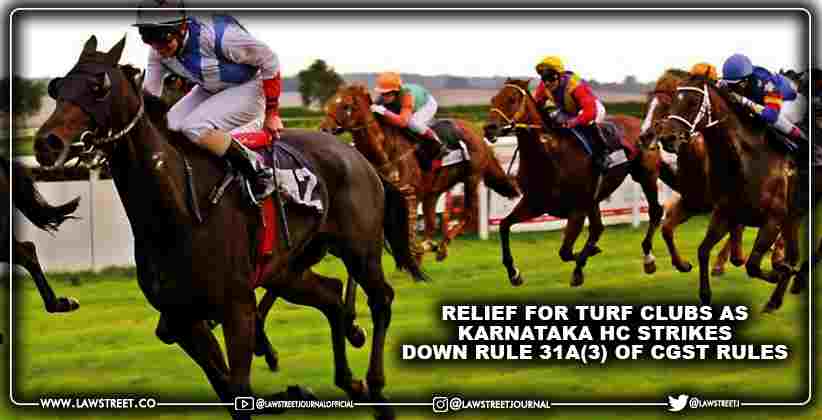In a judgment that gives major tax relief to turf clubs, the Karnataka High Court has struck down Rule 31A(3) of the Central Goods and Services Tax Rules (CGST), 2017.
Sub-clause (3) of Rule 31A of the CGST which was inserted by issuing a notification on January 23, 2018, has been struck down by Justice M. Nagaprasanna on Wednesday (June 2, 2021), for being ultra vires the provisions of the CGST Act.
Sub-rule (3) declares that the value of supply of actionable claim in the form of chance to win in betting, gambling, or horse racing in a race club shall be 100% of the face value of the bet or the amount paid into the totalisator.
The Petitioners are Banglore Turf Club Ltd. and Mysore Race Club Ltd who conduct horse racing and facilitate betting by punters. They had challenged the legislative intent of making the petitioners liable to pay GST on the entire bet.
Explaining the situation before the CGST Rules were introduced, the petitioner submitted that bets are placed by the punter either with a totalisator or a licensed bookmaker. If a horse backed by the punter wins, he receives the prize money of the losing punter. The prize money is distributed by the petitioners to the winning punter and out of that amount the petitioners take their commission.
They further contended that Rule (3) makes GST liable on the entire amount received by the totalisator and since the supply of bets is not in the course or furtherance of the petitioners business and is not being received by him as consideration, the Rule is ultra vires Section 7 of CGST.
The Petitioners contended that the Rule is made beyond the powers conferred under the CGST Act, which would render it to be ultra vires, and have sought a consequential declaration that the CGST and KSGST (Karnataka State Goods and Services Tax) be restricted only to the commission that the petitioners get on holding the amount in the totalisator for a brief period.
On the other hand, counsel for respondents Vikram Huligol contended that the Act mandates levying of tax on the actionable claim and as per the Rules betting is also an actionable claim. The actionable claim is and was existing in the Act since the beginning, the Rule (3) only clarifies the role of the petitioner in the field of betting. Therefore, he submitted that the contention of the petitioners that Rule 31A (3) is ultra vires the CGST Act cannot be construed to be legally sound and requested the writ petition to be dismissed.
Justice M Nagaprasanna noted that betting is neither in the course of the business nor in furtherance of the business of a race club for the Act. All that the petitioners would become liable to pay under the Act is the commission that it receives for rendering service of holding the bet in the totalisator for a brief period in the fiduciary capacity.
While citing several judgments of the Apex Court, the Court said the Rule cannot include the entire amount brought into the totalisator.
Declaring Rule 31A(3) to be ultra vires the CGST Act, the court observed as thus Making the entire bet amount that is received by the totalisator liable for payment of GST would take away the principle that a tax can only be based on the consideration. The commission received by the race clubs is nothing different from a stockbroker or a travel agent- both of whom are liable to pay GST only on the income commission that they earn and not on all the money that passed through them. Therefore, Rule 31A(3) insofar as it declares that the value of the actionable claim in the form to win in a horse race of a race club to be 100% of the face value of the bet is beyond the scope of the Act.
The totalisator has been brought under a taxable event without it being defined so under the Act and therefore Rule 31A(3) was held to exceed the authority granted to it under Section 9 of the Act.
The court held similar provisions of the Karnataka State Goods and Services Act (KSGST) to be ultra vires the CGST Act.
In view of the proceeding analysis, I answer the issues that arose for my consideration in favor of the petitioners striking down Rule 31A(3) of the CGST Rules and Rule 31A of the KGST as being contrary to the CGST Act and hold that the petitioners are liable for payment of GST on the commission that they receive and not on the total amount collected in the totalisator., the Court held.
The Court also held that the petitioner shall be entitled to all consequential benefits that flow from the aforesaid orders.








